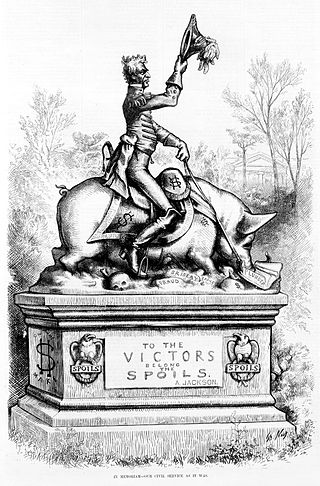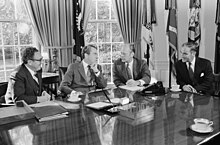Politics in the Philippines are governed by a three-branch system of government. The country is a democracy, with a president who is directly elected by the people and serves as both the head of state and the head of government. The president serves as the leader of the executive branch and is a powerful political figure. A president may only hold office for one six-year term. The bicameral Congress consists of two separate bodies: the Senate, with members elected at-large across the country, and the larger House of Representatives, with members chosen mostly from specific geographic districts. The Congress performs legislative functions. The judiciary is overseen by the Supreme Court of the Philippines and has extensive review jurisdiction over judgments issued by other governmental and administrative institutions.

In politics and government, a spoils system is a practice in which a political party, after winning an election, gives government jobs to its supporters, friends (cronyism), and relatives (nepotism) as a reward for working toward victory, and as an incentive to keep working for the party—as opposed to a merit system, where offices are awarded or promoted on the basis of some measure of merit, independent of political activity.
Accountability, in terms of ethics and governance, is equated with answerability, culpability, liability, and the expectation of account-giving.

Populism is a range of political stances that emphasize the idea of "the people" and often juxtapose this group with "the elite". It is frequently associated with anti-establishment and anti-political sentiment. The term developed in the late 19th century and has been applied to various politicians, parties and movements since that time, often as a pejorative. Within political science and other social sciences, several different definitions of populism have been employed, with some scholars proposing that the term be rejected altogether.
New Right is a term for various right-wing political groups or policies in different countries during different periods. One prominent usage was to describe the emergence of certain Eastern European parties after the collapse of the Soviet Union. In the United States, the Second New Right campaigned against abortion, homosexuality, the Equal Rights Amendment (ERA), the Panama Canal Treaty, affirmative action, and most forms of taxation.

Campaign finance, also known as election finance, political donations or political finance, refers to the funds raised to promote candidates, political parties, or policy initiatives and referendums. Donors and recipients include individuals, corporations, political parties, and charitable organizations.

Jacksonian democracy was a 19th-century political philosophy in the United States that expanded suffrage to most white men over the age of 21 and restructured a number of federal institutions. Originating with the seventh U.S. president, Andrew Jackson and his supporters, it became the nation's dominant political worldview for a generation. The term itself was in active use by the 1830s.

Jeffersonian democracy, named after its advocate Thomas Jefferson, was one of two dominant political outlooks and movements in the United States from the 1790s to the 1820s. The Jeffersonians were deeply committed to American republicanism, which meant opposition to what they considered to be artificial aristocracy, opposition to corruption, and insistence on virtue, with a priority for the "yeoman farmer", "planters", and the "plain folk". They were antagonistic to the aristocratic elitism of merchants, bankers, and manufacturers, distrusted factory workers, and strongly opposed and were on the watch for supporters of the Westminster system.

The Janata Party was a political party in India. It was founded as an amalgam of Indian political parties opposed to the Emergency that was imposed between 1975 and 1977 by Prime Minister Indira Gandhi of the Indian National Congress. In the 1977 general election, the party defeated the Congress and Janata leader Morarji Desai became the first non-Congress prime minister in independent modern India's history.

The Progressive Era (1896–1917) was a period in the United States during the early 20th century of widespread social activism and political reform across that country that focused on defeating corruption, monopoly, waste, and inefficiency. The main themes ended during American involvement in World War I (1917–1918) while the waste and inefficiency elements continued into the 1920s. Progressives sought to address the problems caused by rapid industrialization, urbanization, immigration, and political corruption; and by the enormous concentration of industrial ownership in monopolies. They were alarmed by the spread of slums, poverty, and the exploitation of labor. Multiple overlapping progressive movements fought perceived social, political and economic ills by advancing democracy, scientific methods, professionalism and efficiency; regulating businesses, protecting the natural environment, and improving working conditions in factories and living conditions of the urban poor. Spreading the message of reform through mass-circulation newspapers and magazines by "probing the dark corners of American life" were investigative journalists known as "muckrakers". The main advocates of progressivism were often middle-class social reformers.
Common Cause is a watchdog group based in Washington, D.C., with chapters in 35 states. It was founded in 1970 by John W. Gardner, a Republican, who was the Secretary of Health, Education, and Welfare in the administration of President Lyndon Johnson as well as chair of the National Urban Coalition, an advocacy group for minorities and the working poor in urban areas. In its early days, Common Cause focused its efforts on ending the Vietnam War and lowering the voting age from 21 to 18.

The values and ideals of republicanism are foundational in the constitution and history of the United States. As the United States constitution prohibits granting titles of nobility, republicanism in this context does not refer to a political movement to abolish such a social class, as it does in countries such as the UK, Australia, and the Netherlands. Instead, it refers to the core values that citizenry in a republic have, or ought to have.
Progressivism in the United States is a political philosophy and reform movement. Into the 21st century, it advocates policies that are generally considered social democratic and part of the American Left. It has also expressed itself with right-wing politics, such as New Nationalism and progressive conservatism. It reached its height early in the 20th century. Middle/working class and reformist in nature, it arose as a response to the vast changes brought by modernization, such as the growth of large corporations, pollution, and corruption in American politics. Historian Alonzo Hamby describes American progressivism as a "political movement that addresses ideas, impulses, and issues stemming from modernization of American society. Emerging at the end of the nineteenth century, it established much of the tone of American politics throughout the first half of the century."

The Second Party System was the political party system operating in the United States from about 1828 to 1852, after the First Party System ended. The system was characterized by rapidly rising levels of voter interest, beginning in 1828, as demonstrated by Election Day turnouts, rallies, partisan newspapers, and high degrees of personal loyalty to parties.
These are the references for further information regarding the history of the Republican Party in the U.S. since 1854.

Liberal democracy, Western-style democracy, or substantive democracy is a form of government that combines the organization of a representative democracy with ideas of liberal political philosophy.
Preselection is the process by which a candidate is selected, usually by a political party, to contest an election for political office. It is also referred to as candidate selection. It is a fundamental function of political parties. The preselection process may involve the party's executive or leader selecting a candidate or be some contested process. In countries that adopt Westminster-style responsible government, preselection is also the first step on the path to a position in the executive. The selected candidate is commonly referred to as the party's endorsed candidate.
The New Politics Party, was a political party in Thailand founded on 2 June 2009. The NPP was the political party of the People's Alliance for Democracy, with which it shared the same principles and ideas. Ahead of the 2011 general election, the party broke with the PAD movement, and renamed to Thai Social Democratic Party two years later.
Clientelism or client politics is the exchange of goods and services for political support, often involving an implicit or explicit quid-pro-quo. It is closely related to patronage politics and vote buying. Clientelism involves an asymmetric relationship between groups of political actors described as patrons, brokers, and clients. In client politics, an organized interest group benefits at the expense of the public. Client politics may have a strong interaction with the dynamics of identity politics. This is particularly common in an elite pluralist or rigidly duopolistic system, such as in the United States, where lobbying can have considerable power shaping public policy. The opposite of client politics is 'entrepreneurial' politics, or conviction politics.
During the 1990s New Zealand saw a growth in populism, a political trend whose advocates claim to work for "the people" rather than for the "elite". The rise of populism in the country has been attributed to the introduction of the mixed-member proportional electoral system, as well as to the populist nature of election campaigns, such as that of the Labour Party in the lead-up to the 1999 election. The New Zealand First party, which has historically taken a nationalist standpoint, has been described as a populist party.











